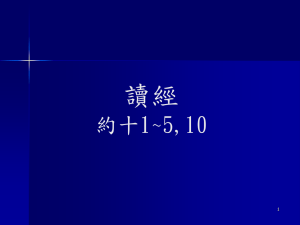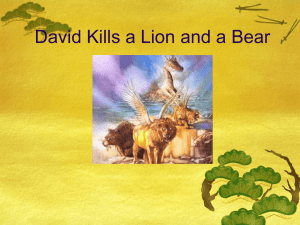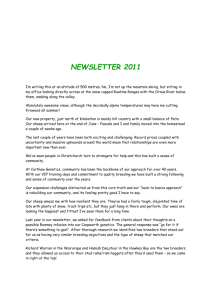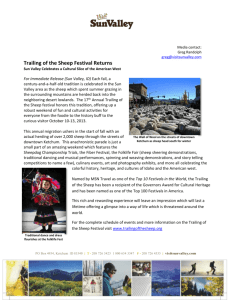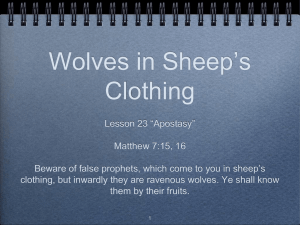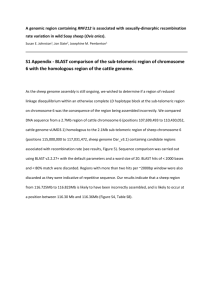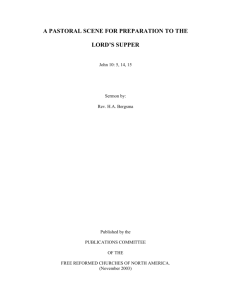Jesus the Shepherd
advertisement
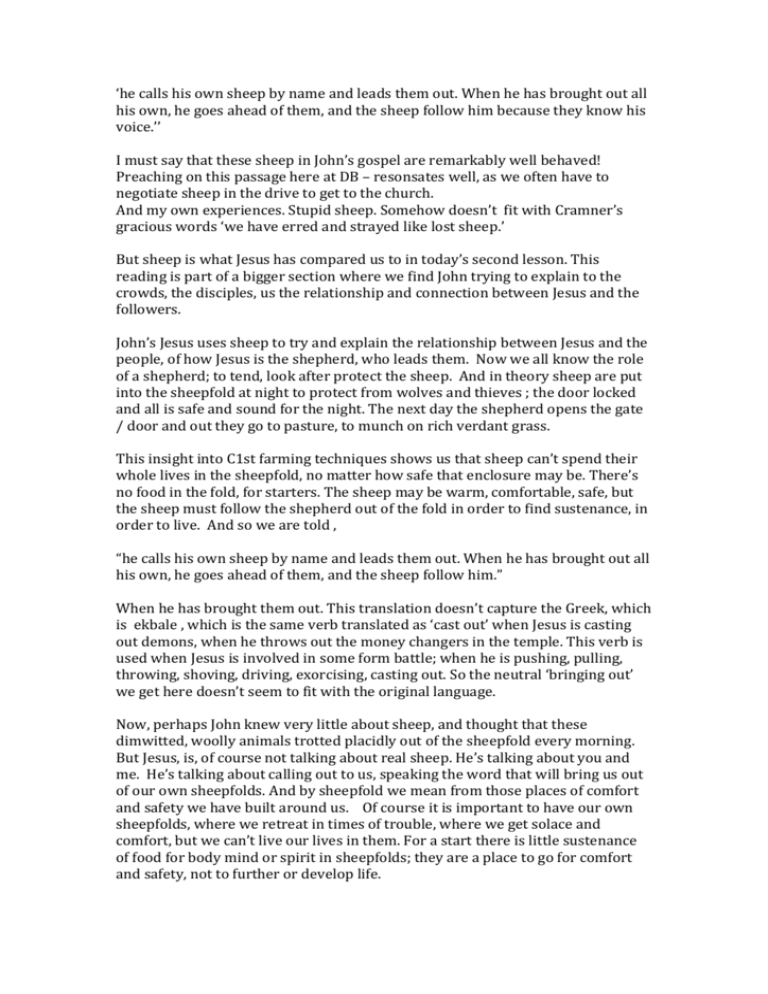
‘he calls his own sheep by name and leads them out. When he has brought out all his own, he goes ahead of them, and the sheep follow him because they know his voice.’’ I must say that these sheep in John’s gospel are remarkably well behaved! Preaching on this passage here at DB – resonsates well, as we often have to negotiate sheep in the drive to get to the church. And my own experiences. Stupid sheep. Somehow doesn’t fit with Cramner’s gracious words ‘we have erred and strayed like lost sheep.’ But sheep is what Jesus has compared us to in today’s second lesson. This reading is part of a bigger section where we find John trying to explain to the crowds, the disciples, us the relationship and connection between Jesus and the followers. John’s Jesus uses sheep to try and explain the relationship between Jesus and the people, of how Jesus is the shepherd, who leads them. Now we all know the role of a shepherd; to tend, look after protect the sheep. And in theory sheep are put into the sheepfold at night to protect from wolves and thieves ; the door locked and all is safe and sound for the night. The next day the shepherd opens the gate / door and out they go to pasture, to munch on rich verdant grass. This insight into C1st farming techniques shows us that sheep can’t spend their whole lives in the sheepfold, no matter how safe that enclosure may be. There’s no food in the fold, for starters. The sheep may be warm, comfortable, safe, but the sheep must follow the shepherd out of the fold in order to find sustenance, in order to live. And so we are told , “he calls his own sheep by name and leads them out. When he has brought out all his own, he goes ahead of them, and the sheep follow him.” When he has brought them out. This translation doesn’t capture the Greek, which is ekbale , which is the same verb translated as ‘cast out’ when Jesus is casting out demons, when he throws out the money changers in the temple. This verb is used when Jesus is involved in some form battle; when he is pushing, pulling, throwing, shoving, driving, exorcising, casting out. So the neutral ‘bringing out’ we get here doesn’t seem to fit with the original language. Now, perhaps John knew very little about sheep, and thought that these dimwitted, woolly animals trotted placidly out of the sheepfold every morning. But Jesus, is, of course not talking about real sheep. He’s talking about you and me. He’s talking about calling out to us, speaking the word that will bring us out of our own sheepfolds. And by sheepfold we mean from those places of comfort and safety we have built around us. Of course it is important to have our own sheepfolds, where we retreat in times of trouble, where we get solace and comfort, but we can’t live our lives in them. For a start there is little sustenance of food for body mind or spirit in sheepfolds; they are a place to go for comfort and safety, not to further or develop life. We’re currently reading through Acts; we hear how the earliest Christians struggled, fought, prayed to be the early church - today’s reading about selling possessions and distributing them to the poor and needy and this illustrates this very early Christian community making a very big commitment , of getting out of the sheepfold, so to speak. And what this illustrates is that I am saying that life as a Christian is risky. Sometimes we need driving, pulling, shoving out of our sheepfolds, si that we can begin life anew. And this is the message of the resurrection; life cannot be conquered – not by death, not by sin, not by the powers of darkness. Life happens – fully – abundantly – intensely, and Jesus tells us today that he came that we all may have life, and have it abundantly. The resurrection ripples out to touch every life, everywhere for all time. The amazingness of Easter morning shows us the utter lengths that God goes to , to offer us abundant life. Today’s gospel is the first one in Eastertide to not be explicitly based on the resurrection events – Emmaus, Doubting Thomas. Except it is also perhaps the most important one to hear in Eastertide, because it tells us that we are to live life to the full, because that is what the resurrection is all about. We are free, our shackles loosen, provided we choose to loose them. Easter calls us to live life to its full; not to put it on hold, not to make it dormant, yes to have places of solace and comfort, but we should know that we can’t live all our lives in them. Otherwise we are not living life in its abundance, but are merely existing. Christ drives us out of the sheepfold so that our lives have the opportunity to expand, so that we may meet another aspect of God in an unknown circumstance; it might be as simple as reading a different translation of the scripture GIVE MORE EXAMPLES so that through it we be may embrace God’s unrestrained abundance. During Eastertide let us all listen for the voice of the good shepherd calling you, calling us by name, calling us out of complancey, And give Christ the chance to cast you out of your sheepfold so that you may find the fullness of a life lived in the abundance of God, our God who conquered death through the resurrection, so that life and not death can be the victor. Amen.
